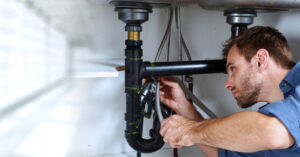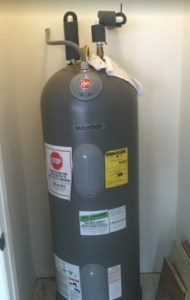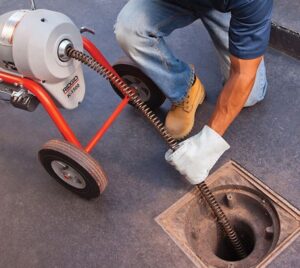To grow a plumbing business, businesses must invest in effective marketing strategies. These tactics will help them stand out from competitors and increase their visibility in the local area.

These tactics include creating a professional website, using SEO services, social media advertising, and retargeting. These are proven ways to get homeowners to book a plumber appointment with your business. Visit https://myjoeplumber.com for more information.
Identifying a target audience is an important part of developing a plumbing marketing strategy. This can help you tailor your marketing message to the needs and preferences of your customer base. This can help you attract new customers and increase your business’s profitability.
One way to find your target audience is by analyzing geographic patterns in your customers’ service requests. This can help you understand the demographic markets in your area and identify which services they are most interested in. Another way to find your target audience is by gathering feedback from your existing customers. This can help you improve your customer service and create more targeted marketing campaigns.
The internet has transformed the way people search for plumbers. Most people rely on online searches to find a plumber near them. As a result, it is crucial to optimize your website and make sure it is mobile-friendly. In addition, it is essential to include your name, phone number, and services on your website. This will ensure that your site appears in local search results and can be easily found by your customers.
Plumbing companies can also use digital marketing strategies to boost their reputation and build trust with potential customers. For example, they can promote their services on social media platforms and encourage customers to post positive reviews. This can help them stand out from their competitors and increase their customer loyalty.
Moreover, a good marketing strategy can also help you manage your cash flow and grow your business. You can do this by implementing a referral program or offering discounts to existing customers. This will help you improve your customer retention rate and reduce the time it takes to acquire new leads. Additionally, you can reduce your expenses by negotiating with suppliers and investing in cost-saving technologies.
Customer service
A good plumbing business should prioritize excellent customer service. This will help to build trust, generate positive reviews, and attract new clients. It also helps to establish a brand and stand out against the competition.
This can be done through various means, such as by offering 24/7 emergency services, writing testimonials on your website, and providing free consultations. It is also a good idea to offer an online review management system that allows you to monitor and respond to reviews.
Creating a customer loyalty program is another effective way to grow your plumbing business. These programs can be structured in many ways, but they all involve rewarding customers for their repeat business. By doing this, you can increase the likelihood of converting leads into paying customers and boost your revenue in the long run.
Plumbing is a highly competitive industry, and it’s important to stand out from the crowd to get more clients. With the right marketing strategy, you can boost your plumbing business and gain a competitive edge over your competitors.
As a local business, it’s important to focus on marketing strategies that target your local market. This can be done by leveraging social media, advertising in local publications, and attending networking events. In addition, you can also try alternative marketing tactics, such as giving away promotional products or leaving business cards at local businesses. Another great way to reach local prospects is by leveraging the power of Google. You can do this by creating a Google Business Profile, which will make it easier for potential customers to find your company. You can also add reviews to your Google listing, which will help to boost your search visibility and reputation.
Invest in technology
Investing in new plumbing technology is one of the most effective strategies for plumbers looking to increase sales and profitability. The right software can help streamline operations, minimize travel time and maximize productivity. Additionally, it can help reduce costs by automating manual processes and eliminating inefficiencies.
Another strategy for plumbing businesses looking to increase sales is to offer a wider range of services. This can allow plumbers to tap into new markets and attract a more diverse clientele. In addition, it can help them build trust and loyalty with clients, which can lead to referrals.
To expand their reach, plumbing companies can use online advertising platforms to showcase completed projects. This can help them stand out from competitors and attract a tech-savvy clientele. Additionally, online reviews can also help increase customer confidence and boost sales.
In the modern world, customers are increasingly demanding more from plumbing companies. This can include a focus on soft skills such as communication and problem-solving. In order to meet these demands, plumbers should provide training and resources for their team members.
In addition, embracing environmentally conscious practices can increase customer satisfaction and showcase a commitment to sustainability. This can also have a positive impact on the local community. For example, water-efficient plumbing can save homeowners money on their bills while also helping to conserve water resources. It can also lower carbon emissions and improve air quality. Ultimately, this can help improve the public image of plumbing companies and attract a more eco-conscious clientele.
Build a strong team
As a business owner, you must ensure that your team members have the right skills and experience to meet your customers’ needs. You should also make sure they’re well trained in the latest plumbing techniques and technology. This will enable you to provide better service and increase customer satisfaction.
A great way to find the best employees for your plumbing business is to reach out to existing customers and ask them for referrals. This will help you find the most qualified candidates and save you time and money in the long run. In addition, you should set clear expectations for the role and responsibilities of your new employees, so they’re on the same page as you regarding what is expected of them.
Managing cash flow is another crucial aspect of scaling your plumbing business. You should make sure that you have a solid payment system in place, which can include requiring a deposit upfront or setting clear deadlines for paying invoices. You should also look for ways to reduce your overhead costs by negotiating with suppliers or finding cost-saving technology or equipment.
Using marketing automation software is a great way to manage your business and optimize your online presence. These tools can help you automate your email campaigns, manage your social media accounts, and track customer behavior and engagement. They can also help you create targeted ads to generate more leads and growth for your plumbing business.
Prioritizing exceptional customer service, leveraging online reviews, and implementing effective marketing are all proven strategies that can help you boost your plumbing business’s growth potential. By following these tips, you can maximize your profits and position your business for success in the industry.
Invest in marketing
As a plumbing business owner, it can be difficult to keep up with new trends and technologies. But investing in marketing is a great way to grow your business. By targeting specific geographic areas, developing a strong online presence, and prioritizing exceptional customer service, you can position your plumbing company for success.
In the digital age, consumers have more options than ever before. As a result, consumers can easily choose not to purchase from businesses that fail to adapt to their needs. With this in mind, it’s more important than ever to develop a well-defined marketing strategy.
For example, leveraging your Google Business Profile can help you increase your online visibility. This includes claiming your profile, making sure your name, phone number, and address are consistent across platforms, and providing valuable information about your services. You can also use pay-per-click advertising to reach customers who are searching for your services in your area.
Lastly, creating a customer loyalty program is an effective way to increase your customer base and drive repeat business. Loyalty programs can be built on a variety of platforms, including email, social media, and text messaging. By determining your target audience and designing a reward system, you can create a loyal customer base that will support your plumbing business for years to come.
Investing in marketing is an essential aspect of growing your plumbing business. By targeting specific geographic areas, developing an online presence, generating positive reviews, and allocating your marketing budget effectively, you can increase your chances of success and grow your plumbing business. With these strategies, you can start to see the rewards of your investment in no time.





